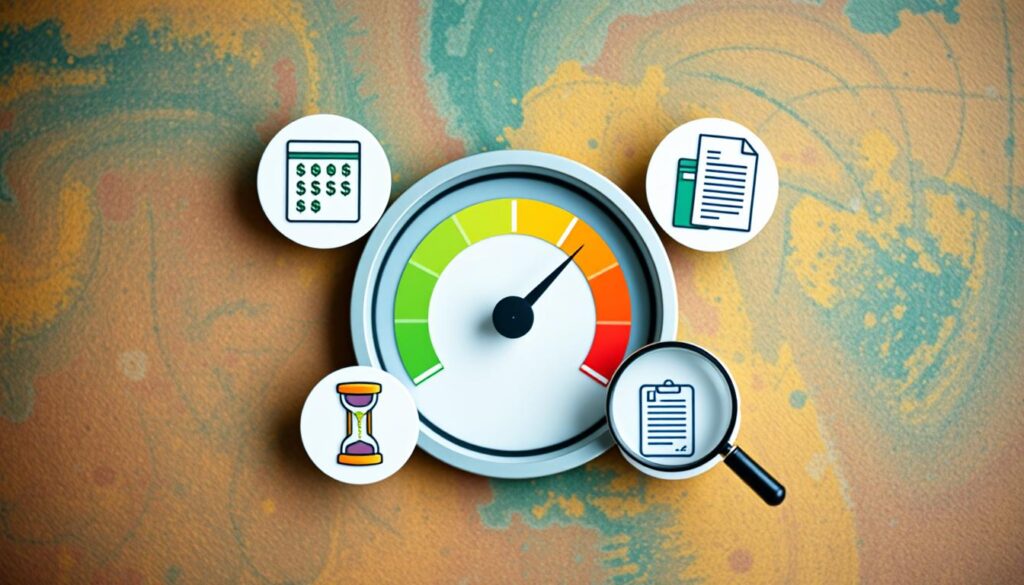Many people struggle with poor credit in today’s complex financial world. Some turn to credit repair companies for a quick fix. But do these companies deliver on their promises?
This article explores credit repair services and their legitimacy. We’ll also look at strategies that can truly improve your financial health.
Key Takeaways
- Credit repair companies claim to help improve credit scores, but their effectiveness is often debated.
- Understanding the role and practices of credit repair firms is crucial in determining their legitimacy.
- Factors like credit report errors, negative items, and responsible credit habits can significantly impact your credit score.
- Legitimate credit repair strategies focus on disputing inaccuracies and building long-term financial responsibility.
- Researching credible credit repair firms and understanding their fees are important steps in selecting the right service.
Understanding Credit Repair Services
Credit repair aims to boost your credit score by fixing report errors. Credit repair services offer to dispute issues with bureaus and creditors. Their goal is to help fix credit score and improve credit history.
What is Credit Repair?
Credit repair involves reviewing your credit report for mistakes. It also includes disputing errors with credit bureaus. Negotiating with creditors is another part of the process.
The aim is to remove negative items affecting your credit score. This can lead to an improved credit standing.
The Role of Credit Repair Companies
Legitimate credit repair companies offer expertise in credit improvement. They claim to navigate the complex credit system effectively. These firms promise better results than individual efforts.
However, it’s crucial to assess the legitimacy of credit repair services. Not all companies deliver on their promises. Careful evaluation is necessary before hiring any service.
| Key Factors to Consider | Legitimate Credit Repair Companies | Unethical Credit Repair Services |
|---|---|---|
| Approach | Focus on identifying and disputing inaccuracies | Attempt to “remove” accurate negative information |
| Legal Compliance | Adhere to the Fair Credit Reporting Act (FCRA) | Engage in unethical or illegal practices |
| Client Expectations | Set realistic expectations for credit improvement | Promise unrealistic or guaranteed results |
Understanding credit repair services helps make informed decisions. Evaluating their legitimacy is crucial. This knowledge aids efforts to fix credit score and improve credit history.
Evaluating the Legitimacy of Credit Repair Firms
Not all credit repair companies are equal. It’s crucial to find credible credit repair firms that follow legal and ethical practices. This guide will help you spot trustworthy providers.
Consider these factors when evaluating a credit repair firm:
- Industry Reputation – Research the company’s track record and read reviews from past clients to gauge their reputation in the industry.
- Transparency – A legitimate credit repair company should be upfront about their services, fees, and the process they follow.
- Legal and Ethical Practices – Reputable firms will comply with the Fair Credit Reporting Act (FCRA) and other relevant laws governing the credit repair industry.
Careful evaluation helps determine if a credit repair company is committed to legitimate credit repair. This information aids in making an informed decision about trusting a firm with your needs.
“Choosing a credible credit repair firm is crucial for effectively improving your credit score and financial well-being.”

Do your homework on potential providers. This ensures you work with a legitimate credit repair service that truly benefits your financial future.
How Do Credit Repair Companies Really Work?
Understanding how credit repair companies operate is vital for improving your creditworthiness. These firms use a systematic approach to address negative items on your credit report.
The Credit Repair Process
Reputable credit repair companies follow these steps:
- Conducting a thorough review of your credit report to identify any inaccuracies, errors, or questionable items.
- Drafting and submitting dispute letters to the credit bureaus, challenging the validity of the negative entries.
- Monitoring the progress of the disputes and following up with the credit bureaus to ensure timely resolution.
- Assisting you in providing additional documentation or evidence to support your case, if necessary.
- Regularly reviewing your credit report to ensure that the disputed items have been removed or updated accordingly.
Legal and Ethical Practices
Legitimate credit repair companies follow strict legal and ethical practices. They operate within the guidelines set by the Fair Credit Reporting Act (FCRA) and other relevant laws.
These companies avoid deceptive tactics. Instead, they focus on empowering you with information and tools to improve your credit legitimately.
Understanding these processes helps you decide if credit repair services match your needs. You can make an informed choice about using their expertise.
Can Credit Repair Companies Fix Your Credit Score?
Credit repair companies claim to fix your credit score. However, their success depends on various factors affecting your credit profile. Understanding these factors helps set realistic expectations for credit repair services.
Factors Affecting Credit Scores
Your credit score is determined by several key factors, including:
- Payment History: Your track record of making timely payments on credit accounts is the most significant factor, accounting for up to 35% of your credit score.
- Credit Utilization: The amount of credit you’re using compared to your total available credit can impact your score, making up 30% of the calculation.
- Length of Credit History: The longer your credit history, the better, as this accounts for 15% of your score.
- Credit Mix: Having a diverse mix of credit types, such as credit cards, loans, and mortgages, can contribute to 10% of your credit score.
- New Credit: Applying for new credit can temporarily lower your score, as this accounts for the remaining 10% of the calculation.
These factors drive your credit score. Credit repair companies must address them to fix credit score and boost credit rating.
Knowing these elements helps you assess credit repair services. You can better judge their potential impact on your finances.

“The key to a healthy credit score is maintaining a responsible credit history over time, not quick fixes.”
Removing Negative Items from Your Credit Report
Credit repair companies help remove negative items from your credit report. These items include late payments, collections, or inaccuracies. This section explains how to dispute these items with credit bureaus.
You can address errors on your own without a credit repair company. We’ll highlight the steps you can take to do this effectively.
Disputing Credit Report Errors
Inaccurate information on your credit report can harm your credit score. You have the right to dispute errors with major credit bureaus: Experian, Equifax, and TransUnion.
The process involves submitting a written dispute with supporting documentation. You’ll need to follow up until the issue is resolved.
- Review your credit report thoroughly to identify any discrepancies or incorrect information.
- Draft a detailed letter outlining the errors and providing evidence to support your claims.
- Submit the dispute to the appropriate credit bureau(s) along with any relevant documents.
- Follow up with the credit bureau(s) to ensure your dispute is being investigated.
- If the credit bureau(s) find the dispute valid, they must remove the negative item from your report.
By disputing credit report errors, you can remove negative items and boost your credit score. This approach doesn’t require a credit repair company.
| Credit Bureau | Dispute Process | Resolution Time |
|---|---|---|
| Experian | Online, by mail, or by phone | 30-45 days |
| Equifax | Online, by mail, or by phone | 30-45 days |
| TransUnion | Online, by mail, or by phone | 30-45 days |
Understanding the dispute process is key to improving your credit profile. Taking proactive steps to remove negative items can lead to a better financial future.
By disputing credit report errors, you’re taking control of your financial health. This effort can result in significant improvements to your credit score.
Boosting Your Credit Rating with Legitimate Practices
There are legitimate ways to enhance your creditworthiness over time. Building a strong credit history requires discipline and commitment. By adopting responsible habits, you can boost your credit rating and improve your credit history.
Making timely payments on all credit accounts is crucial. Payment history significantly impacts your credit score. Set up automatic payments or reminders to avoid missing due dates.
Maintaining a low credit utilization ratio is essential. This measures the amount of available credit you’re using. Keep credit card balances below 30% of your total available credit.
Diversifying your credit mix can positively impact your score. A healthy credit report should include various credit types. This shows lenders you can manage different credit types responsibly.
“Responsible credit habits, such as making timely payments and maintaining low credit utilization, are the foundation of a strong credit history.”
Focus on these legitimate practices to improve your credit history. Building a good credit score takes time, but the benefits are worthwhile. Remember, it’s a marathon, not a sprint.
| Legitimate Strategies | Benefits |
|---|---|
| Make timely payments | Improves payment history, the most important factor in credit scoring |
| Maintain low credit utilization | Demonstrates responsible usage of available credit |
| Diversify credit mix | Shows ability to manage different types of credit accounts |
Do Credit Repair Companies Really Work
Credit repair companies promise to fix your credit by disputing inaccurate information. They claim to negotiate with creditors to improve your score. But do these services actually deliver on their promises?
These firms can help identify errors on your credit report. By challenging unfair items, they may remove negative information. This can boost your overall creditworthiness.
However, credit repair isn’t a quick fix. Results vary based on your specific credit history issues. While credit repair companies may provide assistance, they can’t guarantee a specific credit score or timeline.
Building a strong credit profile takes time and effort. It requires responsible financial habits and ongoing diligence. Credit repair is just one part of the process.
Research a company’s fees, policies, and track record before hiring them. Some firms use unethical practices or make unrealistic promises. Combine professional help with your own credit management strategies.
Dispute errors yourself and pay bills on time. Keep your credit card balances low. These actions can significantly improve your credit score.
Credit repair companies can help in certain situations, but they’re not a miracle solution. Approach credit repair with realistic expectations. Focus on sustainable practices for long-term financial well-being.
Improving Your Credit History: A Long-Term Approach
Enhancing your credit health requires a long-term approach. Focus on developing responsible credit habits. This strategy can improve your credit history and boost your FICO score over time.
Responsible Credit Habits
Building a strong credit history demands consistent financial management. Here are key strategies to foster responsible credit habits:
- Make timely payments on all your credit accounts, including credit cards, loans, and bills. Payment history is the most significant factor in determining your credit score.
- Keep your credit card balances low, ideally below 30% of your available credit limit. High credit utilization can negatively impact your score.
- Diversify your credit mix by having a combination of different types of accounts, such as credit cards, installment loans, and mortgage loans.
- Monitor your credit report regularly and dispute any errors or inaccuracies you find. Maintaining the accuracy of your credit report is crucial.
- Limit new credit applications, as each hard inquiry can temporarily lower your score.
Implementing these habits consistently can improve your credit history. Over time, this leads to a higher FICO score.
Your financial stability will grow with better borrowing opportunities. The effort is worth the rewards.

“Building a strong credit history takes time and diligence, but the rewards of financial stability and better borrowing opportunities are well worth the effort.”
Raising Your FICO Score: Tips and Strategies
Your FICO score greatly affects your creditworthiness to lenders. There are ways to boost your score and improve your credit history. By using these tips, you can boost your credit rating and get better financial opportunities.
To raise your FICO score, keep your credit card balances low. Try to use 30% or less of your credit limits. This shows you’re using credit responsibly.
Keeping older credit accounts open can help your credit score. It builds a stronger credit profile for lenders to see.
Maintaining older credit accounts and avoiding closing them unnecessarily can help build a stronger credit profile. This shows lenders you’ve managed credit well over time.
Having different types of credit can improve your credit history. Mix credit cards, installment loans, and mortgages. This proves you can handle various credit types.
“Improving your FICO score is a marathon, not a sprint. By implementing these strategies consistently, you can boost your credit rating and access more favorable financial opportunities over the long term.”
Raising your FICO score takes time and patience. Keep using these tips and be responsible with credit. Your score will improve over time.
Credible Credit Repair Firms: What to Look For
Identifying credible credit repair firms is crucial for improving your financial health. These providers should be reputable, transparent, and follow legal practices. Understanding key signs of trustworthy companies helps you avoid fraudulent services.
Signs of a Reputable Company
A credible credit repair company should have certain characteristics. Look for firms with strong reputations and positive customer feedback. They should offer clear pricing and explain their services thoroughly.
Reputable companies comply with federal and state regulations, including the Credit Repair Organizations Act. They focus on educating clients and use ethical practices. Avoid firms that guarantee specific credit score increases.
- Strong industry reputation and positive customer reviews
- Transparent pricing and clear explanation of services
- Compliance with federal and state regulations, including the Credit Repair Organizations Act (CROA)
- A focus on educating clients and empowering them to improve their credit on their own
- Ethical and legal practices, with no promises of guaranteeing a specific credit score increase
Thoroughly vetting credit repair firms ensures you choose a legitimate service. This increases the chances of improving your financial standing effectively. Careful selection helps answer the question: do credit repair companies really work?

“Selecting a reputable credit repair company is crucial to achieving lasting improvements to your credit history and financial well-being.”
The Cost of Credit Repair Services
Credit repair services come with varying costs. These services aim to boost credit scores. Understanding pricing and hidden costs is vital when evaluating credit repair companies.
Understanding Fees and Charges
The cost of credit repair services can include several fees. These may range from upfront charges to monthly payments.
- Upfront fees: Many credit repair companies charge an initial setup or enrollment fee, which can range from $50 to $500 or more.
- Monthly or ongoing charges: Recurring monthly fees are common, often ranging from $50 to $150 per month.
- Additional charges: Some companies may also charge fees for specific services, such as credit report retrieval, dispute filing, or identity theft protection.
Review pricing and hidden costs before choosing a credit repair service. Costs can vary based on the company and services offered.
The complexity of your credit situation also affects the price. Always compare different options before making a decision.
The cost of credit repair services may seem high. However, the benefits can outweigh the investment for some people.
Improved credit scores can lead to better interest rates. They may also help you qualify for lower insurance premiums.
Good credit history can even open up new job opportunities. Consider these potential gains when weighing the costs.
Alternatives to Credit Repair Companies
You can improve your credit without using repair companies. One option is to monitor your credit reports yourself. Address errors directly with credit bureaus to resolve issues independently.
Non-profit credit counseling agencies offer another solution. They provide guidance on budgeting and debt management. These agencies can help you develop healthy financial habits.
They may also negotiate with creditors for better terms. This can lead to reduced interest rates and more favorable conditions.
Financial education resources are also available. Online tutorials and budgeting tools can boost your credit knowledge. Credit-building workshops empower you to improve your rating independently.
Taking a proactive approach gives you control over the process. You can achieve similar results to working with a credit repair company. This method allows you to own your credit improvement journey.

